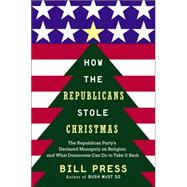
BILL PRESS is a political commentator for MSNBC. Prior to joining MSNBC, he was cohost of CNN’s Crossfire and The Spin Room with Tucker Carlson. He has enjoyed a high-profile career in government, politics, and broadcasting for three decades and served as chairman of the California Democratic Party from 1993 to 1996. He was named Best Commentator of the Year by the Associated Press and has received numerous other awards for his work, including four Emmys and a Golden Mike Award. He is the author of Spin This! and Bush Must Go and writes a syndicated newspaper column distributed by Tribune Media Services. A native of Delaware, Press now lives in Washington, D.C., and maintains a home in northern California.
| Introduction | 1 | (34) | |||
|
35 | (38) | |||
|
73 | (22) | |||
|
95 | (27) | |||
|
122 | (31) | |||
|
153 | (27) | |||
|
180 | (25) | |||
|
205 | (23) | |||
| Conclusion Reclaiming the Moral High Ground | 228 | (36) | |||
| Coda Faith Comes to Life | 264 | (7) | |||
| Bibliography | 271 | (4) | |||
| Acknowledgments | 275 |
The New copy of this book will include any supplemental materials advertised. Please check the title of the book to determine if it should include any access cards, study guides, lab manuals, CDs, etc.
The Used, Rental and eBook copies of this book are not guaranteed to include any supplemental materials. Typically, only the book itself is included. This is true even if the title states it includes any access cards, study guides, lab manuals, CDs, etc.
Excerpted from How the Republicans Stole Christmas: The Republican Party's Declared Monopoly on Religion and What Democrats Can Do to Take It Back by Bill Press
All rights reserved by the original copyright owners. Excerpts are provided for display purposes only and may not be reproduced, reprinted or distributed without the written permission of the publisher.